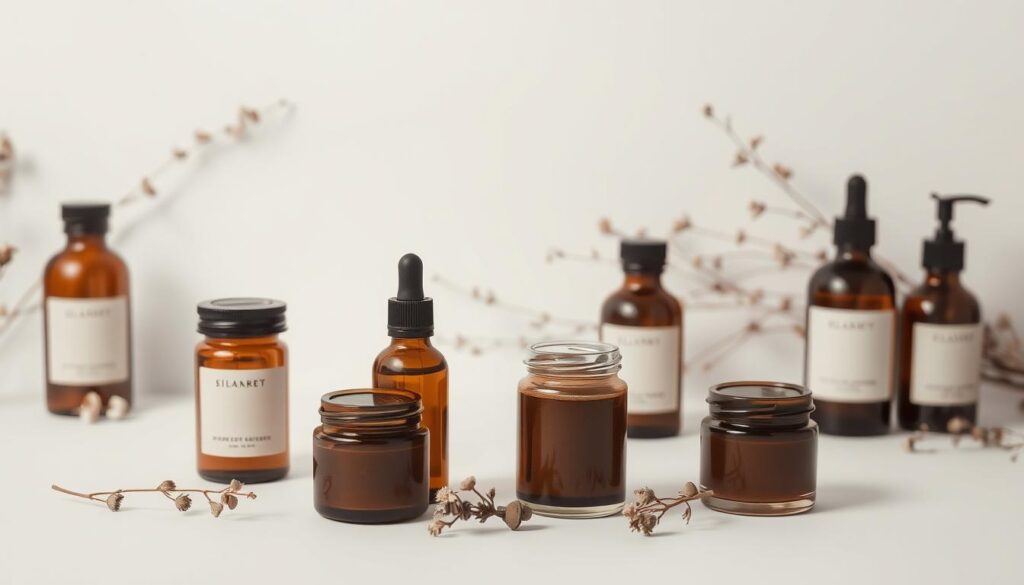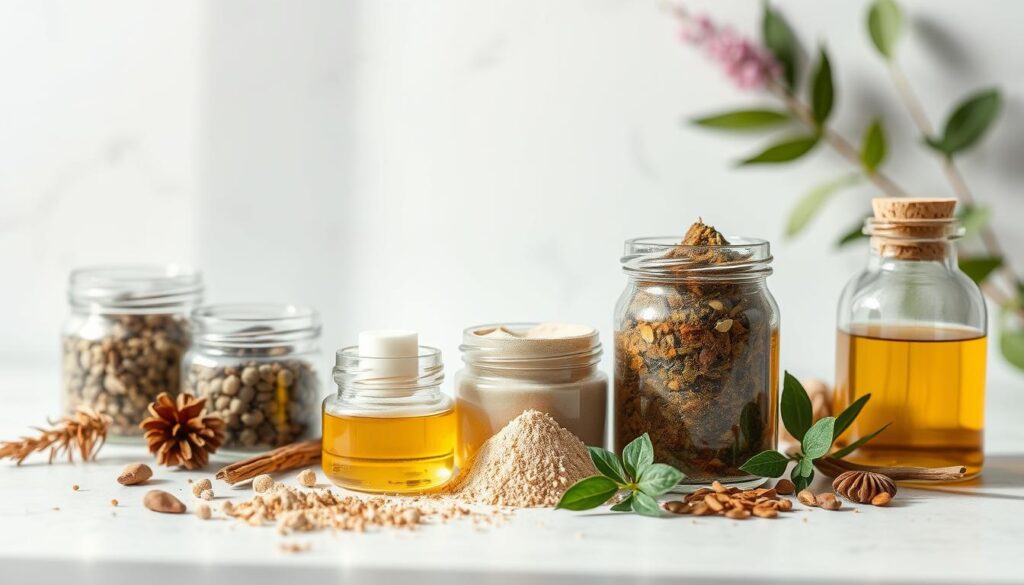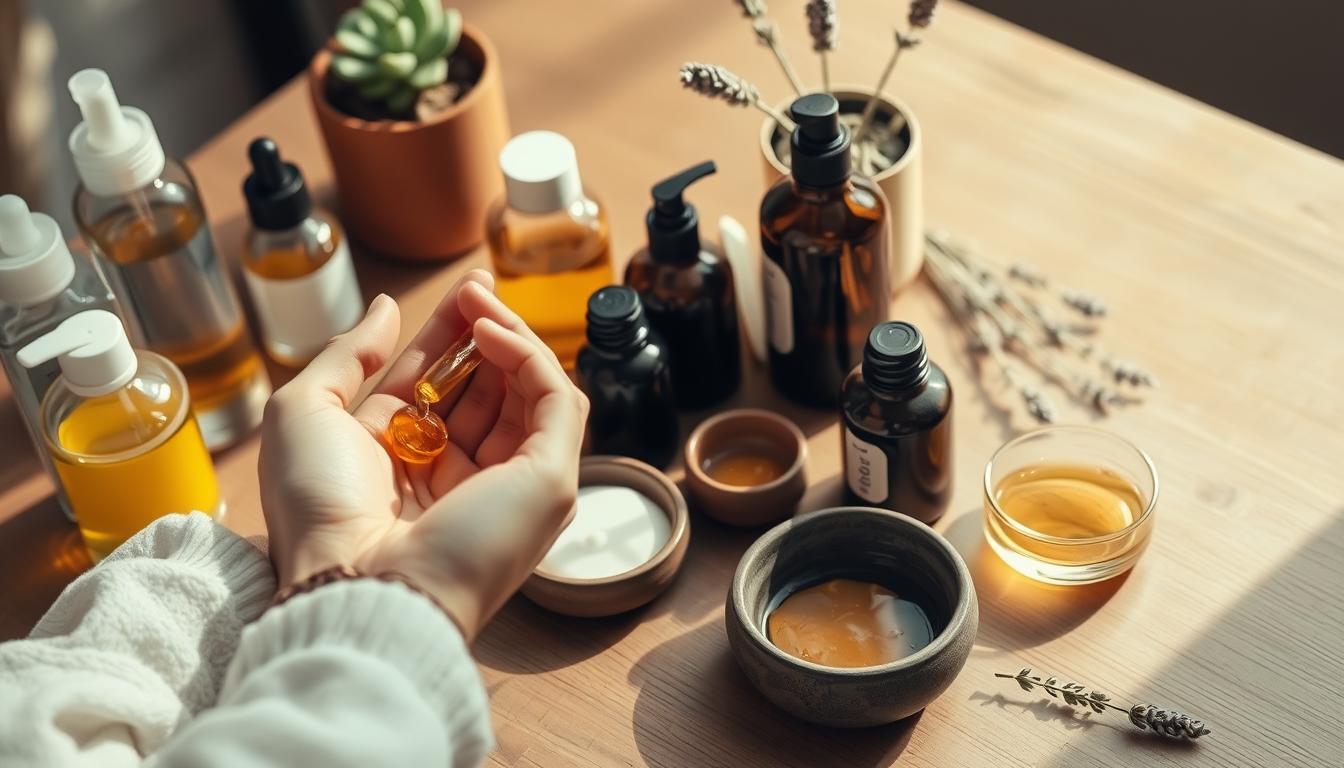Handmade skincare is making a strong comeback in the UK, blending tradition with modern eco-conscious values. Many are turning to plant-based formulas for their skin, drawn by the control over ingredients and reduced exposure to harsh chemicals. Whether you have dry, oily, or sensitive skin, these products offer gentle, customisable solutions.
Research shows that botanical extracts deliver essential vitamins and antioxidants, supporting healthier beauty habits. With over 100,000 formulators in communities like Formula Botanica, the indie skincare market is thriving. This trend also aligns with growing demand for sustainability in personal care.
This guide will walk you through selecting natural ingredients, adapting formulas seasonally, and ensuring safety. Whether you’re a beginner or an enthusiast, building a mindful routine has never been easier.
Key Takeaways
- Handmade skincare blends heritage with eco-friendly values.
- Plant-based formulas suit dry, oily, or sensitive skin types.
- Botanical ingredients provide vitamins and antioxidants.
- Independent brands are leading the green beauty movement.
- Seasonal adjustments keep routines effective year-round.
Introduction to Natural Skincare with Handmade Products
More Brits are embracing plant-based skincare, prioritising purity and sustainability. These products avoid parabens, sulphates, and synthetic fragrances—common irritants linked to sensitivity in a 2018 study. Instead, they harness natural ingredients like aloe vera and chamomile for gentler care.
Labels like “green” or “clean” aren’t regulated, so diligence is key. Homemade options offer freshness but require preservative-free formulas and shorter shelf lives. Commercial brands, meanwhile, balance efficacy with sustainability—62% of UK shoppers now prefer eco-friendly packaging.
The benefits extend beyond skincare. Ethical sourcing, vegan certifications, and fair-trade practices reflect growing consumer values. As the global market expands, these choices protect both skin and environment.
Whether handmade or boutique, these products redefine self-care. They’re a nod to tradition, yet fit seamlessly into modern lifestyles. For many, it’s a shift years in the making—one rooted in health and responsibility.
Why Choose Natural Skincare?
Switching to plant-powered skincare isn’t just a trend—it’s a mindful choice for healthier skin and planet. Unlike mass-produced alternatives, handmade formulas prioritise purity, harnessing ingredients like jojoba oil, celebrated for its anti-inflammatory properties in a 2021 review.
The Benefits of Handmade Skincare
Botanical extracts deliver vitamin-rich nourishment without synthetic irritants. For instance, chamomile soothes redness, while rosehip oil’s fatty acids repair dryness. “Reduced exposure to allergens like methylisothiazolinone means fewer reactions,” notes a dermatologist from Formula Botanica’s Wild Grace case study.
Environmental and Sustainability Advantages
Handmade skincare slashes microplastic pollution—a UK Parliament report cites cosmetics as the source of 80% of ocean microplastics. Brands like Wild Grace cut their carbon footprints by sourcing British rapeseed oil locally.
Upcycling thrives too: coffee grounds exfoliate, and citrus peels brighten. It’s a win for your skin and the environment.
“Sustainable beauty isn’t niche anymore—it’s a necessity.”
Essential Ingredients for Your Handmade Skincare
The foundation of effective handmade skincare lies in carefully selected botanicals. From nourishing oils to revitalising antioxidants, each component plays a vital role. Here’s how to choose the best ingredients for radiant, healthy skin.
Plant-Based Oils and Butters
Cold-pressed oils retain more nutrients than refined versions. For example, rosehip oil is rich in vitamin A, while argan oil delivers omega-9 fatty acids. These ingredients soothe and repair dry skin.
| Oil | Key Benefit | Best For |
|---|---|---|
| Cornish hemp oil | Balances sebum | Oily skin |
| Sea buckthorn | High in vitamin C | Dullness |
| Welsh lavender | Calms irritation | Sensitive skin |
Natural Exfoliants and Antioxidants
Gentle exfoliants like oatmeal remove dead cells without irritation. Harsher options, such as walnut shells, may damage delicate skin. For antioxidants, green tea extract (EGCG) fights free radicals effectively.
Storage tip: Keep water-based products refrigerated. Use amber glass bottles for photosensitive oils like pomegranate seed oil.
“Cold-pressing preserves 90% of an oil’s beneficial properties.”
How to Create Your Natural Skincare Routine
Balancing morning and evening rituals with handmade products maximises skin benefits. Each step, from cleansing to protection, works synergistically with plant-based ingredients. Tailoring your routine to the time of day ensures optimal absorption and results.
Morning Rituals for Radiant Skin
Start with a gentle aloe vera cleanse to remove overnight impurities. Follow with rosewater to tone and prep for hydration. The American Dermatology Association (ADA) emphasises SPF 30+ sunscreen—mineral options like zinc oxide shield without clogging pores.
Bakuchiol, a natural retinol alternative, brightens without irritation. A 2018 study found it boosts collagen as effectively as synthetic retinoids. Pair with a lightweight cream for daytime moisture.
Evening Steps for Deep Nourishment
Double-cleanse using an oil blend (castor and olive) to dissolve makeup and pollutants. A clay mask twice weekly draws out toxins. Pro tip: Allow 15 minutes between serum and moisturiser for better penetration.
| Time | Key Steps | Recommended Tools |
|---|---|---|
| Morning | Cleanse → Tone → SPF | Konjac sponge |
| Evening | Oil cleanse → Mask → Serum | Gua sha stone |
Seasonal shifts matter. Swap aloe gels for shea butter in winter, and use lighter oils like grapeseed in summer. Adjusting to heat and humidity keeps skin balanced year-round.
“Consistency in your routine is the secret to lasting results.”
DIY Handmade Skincare Recipes
DIY skincare isn’t just cost-effective—it’s a creative way to harness nature’s best for your face. With a few pantry staples, you can whip up treatments tailored to your skin’s needs. Always use weight-based measurements for precision, as Formula Botanica recommends.
Brightening Blueberry Face Mask
Packed with vitamin C, this mask combats dullness. Blend 1 tbsp crushed blueberries, 1 tsp manuka honey, and ½ tsp lemon juice. Apply to a clean face, leave for 10 minutes, then rinse with warm water.
Tip: For sensitive skin, swap blueberries for raspberries. Patch-test acidic ingredients like lemon juice first.
Soothing Aloe Vera Toner
This pH-balanced toner calms irritation. Mix 60ml aloe gel, 30ml witch hazel, and 10 drops chamomile essential oil. Store in a spray bottle—refrigerate and use within 7 days.
Honey’s antibacterial properties make it ideal for blemish-prone skin. For dry types, add a drop of rosehip oil to boost hydration.
“Weight accuracy ensures consistent results in homemade skincare.”
Customise these products seasonally—add a dab of cream in winter or lighter oils in summer. Remember, fresh skincare lacks preservatives, so small batches work best.
Tailoring Your Routine to Your Skin Type
Customising your skincare to match your skin type enhances results dramatically. Whether your complexion is dry, oily, or prone to irritation, targeted care ensures nourishment without overwhelm. Handmade products shine here—their adaptable formulas cater to individual needs.

For Dry or Sensitive Skin
Dry or sensitive skin thrives on gentle, hydrating ingredients. A 2021 study found jojoba oil mimics the skin’s natural sebum, making it ideal for repair. Marula oil serums and honey-infused cleansers lock in moisture without irritation.
Colloidal oatmeal baths soothe redness, while calendula-infused oils reduce inflammation. Pro tip: Avoid alcohol-based toners—opt for aloe vera or chamomile instead.
For Oily or Acne-Prone Skin
Oily skin benefits from balancing actives like willow bark extract (a natural salicylic acid). Tea tree oil, at 5% concentration, fights acne-causing bacteria effectively. Green tea toners mattify shine without stripping moisture.
Bentonite clay masks detoxify pores, while zinc oxide spot treatments calm breakouts. Note: Maintain a pH of 4.5–5.5 to protect your skin’s barrier.
| Skin Type | Key Ingredients | Avoid |
|---|---|---|
| Dry/Sensitive | Marula oil, oatmeal | Alcohol, fragrances |
| Oily/Acne | Willow bark, tea tree | Comedogenic oils |
“Personalisation isn’t a luxury—it’s the cornerstone of effective skincare.”
Sustainability in Handmade Skincare
Eco-conscious beauty isn’t just about ingredients—it’s a commitment to the planet. Handmade skincare champions sustainability through ethical packaging and waste-free habits. With the UK Plastic Pact 2025 pushing for change, brands and DIY enthusiasts alike are rethinking their environmental footprint.
Eco-Friendly Packaging Choices
Formula Botanica advocates airless pumps over jars to preserve products and reduce contamination. Reusable amber glass bottles shield oils from light, while metal tins and compostable labels cut plastic waste. Pro tip: Local health shops often offer bulk oils, encouraging refillable containers.
Reducing Waste in Your Routine
Zero-waste hacks turn everyday items into skincare tools. Upcycled yoghurt pots hold scrubs, and cloth wraps replace single-use packaging. For water conservation, steam-distilling floral waters from garden petals is a clever process.
“By 2025, 100% of UK skincare packaging must be reusable, recyclable, or compostable.”
- Carbon offset: Partner with initiatives like Tree Sisters for ethical ingredient sourcing.
- Refill schemes: Support brands offering bulk buys to minimise container waste.
Safety Tips for Homemade Skincare
Making your own skincare at home gives you control over the ingredients, but safety should always come first. Proper preservation, testing, and storage ensure your products remain effective and safe to use. Here’s how to avoid common pitfalls.

Preserving Your Products
Homemade skincare lacks synthetic preservatives, so extra care is needed. Formula Botanica recommends sterilising equipment with 70% isopropyl alcohol before use. This step prevents bacterial contamination.
For water-based products, consider natural preservatives like Leucidal Liquid SF or Geogard ECT. Avoid grapefruit seed extract—studies show it’s ineffective against mould. Always label containers with creation dates and shelf life.
- Storage: Keep oils in amber glass bottles away from sunlight.
- Freezing: Oil infusions last longer when frozen in small batches.
- Water content: Refrigerate any formula containing water and use within a week.
Patch Testing and Allergies
Even natural ingredients can cause reactions. Always perform a 48-hour patch test behind the ear before full application. Photograph any redness or swelling for reference.
Common allergens include linalool in lavender and benzyl alcohol in balms. If irritation occurs, rinse with warm water and discontinue use. For severe reactions, consult a dermatologist immediately.
“Proper testing ensures your homemade creations are as safe as they are effective.”
When disposing of expired products, avoid pouring oils down drains—compost instead. With these precautions, you can enjoy handmade skincare with confidence.
Conclusion
Building a mindful skincare approach starts with small, intentional steps. Focus on your skin type, experiment with gentle botanicals, and prioritise safe preservation methods. A gradual shift works best—swap one commercial item monthly for a handmade alternative.
Join UK workshops or online communities to share formulation tips. With 68% of Brits now choosing sustainable beauty (Mintel 2024), every eco-friendly choice counts. Calculate your beauty carbon footprint to see the impact.
For those keen to dive deeper, Formula Botanica offers free training. Whether for personal care or career growth, handmade products blend wellness with respect for the environment. Your routine becomes more than habit—it’s a statement.


 using WordPress and
using WordPress and
No responses yet